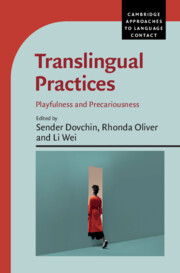Book contents
- Translingual Practices
- Cambridge Approaches to Language Contact
- Translingual Practices
- Copyright page
- Contents
- Figures
- Tables
- Contributors
- Foreword
- Acknowledgements
- 1 Introduction
- Part I Beyond Translingual Playfulness
- Part II Online Activism
- Part III Critical Pedagogy
- 9 ‘Because I Growed up … Big Martu Ways’
- 10 Translanguaging, Translinguality, and Labor
- 11 The Political Underbelly of Translingual Practices in English-Medium Higher Education
- Part IV Ways Forward
- Index
- References
10 - Translanguaging, Translinguality, and Labor
from Part III - Critical Pedagogy
Published online by Cambridge University Press: 07 May 2024
- Translingual Practices
- Cambridge Approaches to Language Contact
- Translingual Practices
- Copyright page
- Contents
- Figures
- Tables
- Contributors
- Foreword
- Acknowledgements
- 1 Introduction
- Part I Beyond Translingual Playfulness
- Part II Online Activism
- Part III Critical Pedagogy
- 9 ‘Because I Growed up … Big Martu Ways’
- 10 Translanguaging, Translinguality, and Labor
- 11 The Political Underbelly of Translingual Practices in English-Medium Higher Education
- Part IV Ways Forward
- Index
- References
Summary
Much translanguaging and translinguality scholarship focuses on defending and celebrating recognizable forms of language difference – e.g., “Chinglish” – as creativity and agency by the socioeconomically precarious manifesting a micropolitics of resistance. This focus obscures the concrete labour of all utterances, whether deemed conventional or not, by all language users, whether “native” or not, contributing to maintaining and revising language as practice, and, hence, obscures the dependence of dominant culture’s continuity on such labor and, hence, its precarity. Samples from the assigned writing of a bilingual (French/English) student attending a required US undergraduate writing course are shown to exhibit a mix of conventional and unconventional linguistic forms and, more importantly, writerly agency in the writing’s manifestation of criticality toward dominant views of first-year undergraduate writing students as mere recipients of others’ knowledge and its deft deployment of language to produce knowledge. Shifting to a focus on language users’ contribution of their labor to maintaining and revising language and knowledge can bring out the agency of all utterances, the status of criticality and creativity as the norm of language use, the emergent character of language, and, thus, the precarity of dominant culture.
- Type
- Chapter
- Information
- Translingual PracticesPlayfulness and Precariousness, pp. 182 - 196Publisher: Cambridge University PressPrint publication year: 2024



